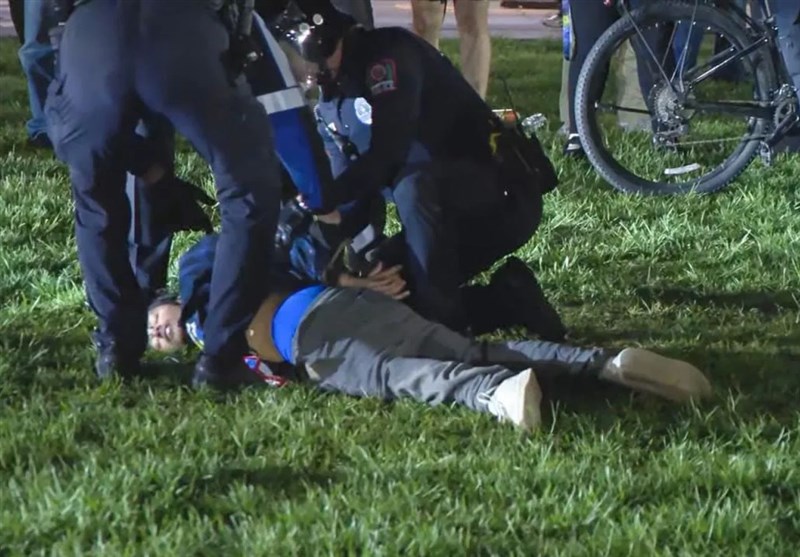Strategies of universities to suppress protesting students in America

| US universities are using a combination of policing and disciplinary action to force students who are peacefully protesting the genocide in Gaza to withdraw. |
According to the international group Tasnim news agency, the American police in the past days more than 900 students who had demonstrated throughout this country to support Palestine and oppose the crimes of the Zionist regime in Gaza. Despite this, the intensification of the repressions has not only caused the protests to subside, but has brought the anger of the protesters and the flames of the protests. In a note in the Guardian newspaper, he predicted that in the coming weeks we will see the expansion of student camps in support of Palestine. However, American universities are trying to keep students away with a combination of repressive police measures and tactics. to force to retreat. CNN reported that dozens of students who protested the war in Gaza were arrested at New York and Yale universities last day.
At the University of Texas at Austin, police in riot gear and on horseback tried to disperse protesters. Nearly 100 people were arrested at the University of Southern California. At Emory University in Atlanta, police fired pepper spray at protesters and arrested 28 people, including several professors. At Boston’s Emerson College, 108 more protesters were arrested and four officers were injured.
The violent crackdown has reignited a long-running debate about the role of campus policing. Analysts say that the militarization of the police after the events of September 11, 2001, which was visible in the protests of recent years, has shown itself this time in these demonstrations. In an interview with CNN, he said that the entry of police forces into the university is a “severe measure” that should be reserved for direct and more serious threats to the university campus. There will be a loss of trust between the university and the students who will see the police arresting their classmates and perhaps their professors before their eyes. “In many ways, it’s a dark time for universities,” Greenberg said.
While human rights activists describe police raids on campuses and violent arrests of students as a violation of students’ free speech and academic freedoms, others Activists warn that focusing on American issues may divert the world’s attention from the suffering of the Palestinian people.
The university officials also imposed a series of disciplinary orders, from suspension from the university to expulsion and exclusion from the exam and The class has gone to war with the students. In a situation where the students insist that their demonstrations are peaceful, the university authorities describe the gatherings as “anti-Semitic” or “disruptive”. A place for discussion in the program of universities
Yesterday, in an announcement, the officials of Columbia University drew the sword for the students and warned that if the sit-ins are not found, crimes ranging from suspension to expulsion and deprivation of education It will be waiting for the students.
The response of the officials of the American universities to these demonstrations took place in the context of wide-ranging debates on the role of America in Israel’s war crimes; CNN wrote that such debates have caused some university presidents to surrender to the pressure of congressional lawmakers or even to be removed from their positions (such as the president of Harvard University) in the past few months.
Many analysts consider the excessive resorting of universities to repressive tactics and methods to crush demonstrations as a sign of universities’ unwillingness to talk with students and pay attention to their demands amid the decision of governing institutions to unconditionally support Israel.
Dima Khalidi, managing director of “Palestine Legal” Institute, who has been representing students against disciplinary orders issued by universities for the past few months, said: “Instead of interacting with the protesters, they are suppressing them. The police response on many campuses represents a disturbing and troubling escalation of state repression and violence against students who are peacefully protesting an ongoing genocide.
Gaza issues should not be sidelined by university protests
He continued: “All these are distractions for us to take our eyes from Gaza to the other side; Gaza, where mass graves are discovered, people are dying of starvation, and where 35,000 Palestinians have been killed. These are the issues that the students are trying to draw the world’s attention to.”
Khalidi clarified in another part of his statement that issuing suspension orders to dissident students and simultaneously sending military aid to Israel sends this message to the students. And it sends other like-minded people in society that “they don’t matter.” Despite this, the protesters do not give up their demands.
He clarified: “They know that their work is morally right. They know they are part of a sensitive tradition of student activism, from anti-Vietnam War to civil liberties movements and beyond. We see that students have taken seriously their role and their moral duty to mobilize their communities to speak against oppression. And I think history will remember them well. In American universities
end of message/
| © | Webangah News Hub has translated this news from the source of Tasnim News Agency |





